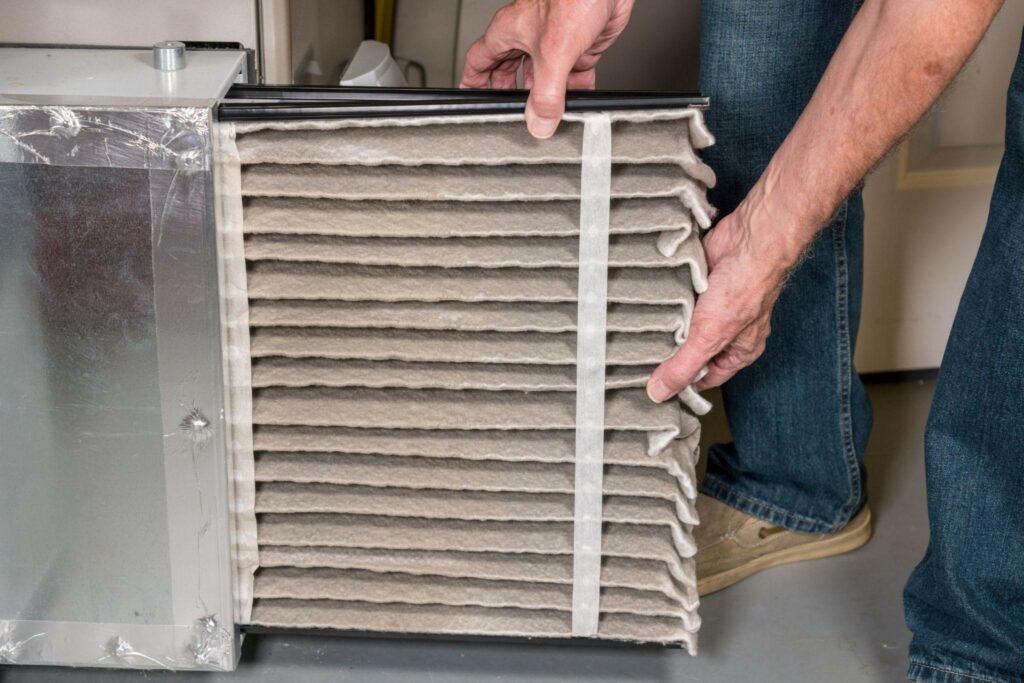Selecting the right air filter for your HVAC system might seem like a small task, but it’s essential for a healthy home and energy efficiency. The right filter not only enhances the air you breathe but also helps your system run smoothly and saves you money in the long run. With a range of brands and filter types out there all claiming to be the best, it’s easy to feel lost.
WM Buffington has over 70 years of experience serving our community with expert, friendly, and reliable service, and our priority is to deliver the best HVAC solutions and insight to our customers. Here’s our top advice for choosing the right air filter for your HVAC system.
In addition to brand, air filters are mostly differentiated by the materials they’re made from, which can affect both their efficiency and ability to filter out particles of various types and sizes. Here’s an overview of the most common options:
Fiberglass filters are the most basic and cost-effective choice, composed of layered fiberglass fibers. These filters are effective at trapping larger particles such as dust and lint but fall short when it comes to capturing smaller particles and allergens. They are best suited for homes with minimal dust and where high efficiency is not a major concern.
Pleated filters are made from polyester or cotton and feature a pleated design that increases their surface area. This design allows them to capture a broader range of particles, including smaller dust and allergens, making them more effective than fiberglass filters. They offer a good balance between cost and performance, making them a suitable choice for homes with moderate dust and allergens.
HEPA filters, or High-Efficiency Particulate Air filters, are renowned for their ability to trap at least 99.97% of particles as small as 0.3 microns. This makes them highly effective at capturing many types of allergens, mold spores, and some bacteria. HEPA filters are ideal for homes with allergy sufferers or where air quality is a significant concern.
Activated carbon filters feature a coating of activated carbon, which helps remove odors and gaseous pollutants from the air. While they excel at eliminating unpleasant smells and volatile organic compounds (VOCs), they are less effective at filtering out dust and allergens. These filters are best for homes where odor control and maintaining indoor air pollution are primary concerns.
Electrostatic filters use an electrostatic charge to attract and capture airborne particles. These filters are washable and reusable, offering a cost-effective solution with strong particle removal capabilities. They are a good option for those looking for strong particle-trapping performance with the benefit of reusability.
Each air filter type offers distinct advantages, so consider your unique air quality concerns, budget, and maintenance schedule when selecting a filter.

When selecting the appropriate filter for your home, begin by assessing your air quality needs. If you have allergies or respiratory concerns, a HEPA filter may be the best choice due to its superior ability to capture tiny particles. For those looking to address odors and VOCs, an activated carbon filter offers a more effective solution.
Next, evaluate the filter’s MERV rating, which indicates its efficiency at trapping particles. Higher MERV ratings usually mean better filtration, but ensure the filter you choose is compatible with your HVAC system’s specifications (read more on MERV ratings below). Consider your budget as well; while high-efficiency filters can be more expensive, they may save you money in the long run through improved system efficiency and reduced energy costs.
Finally, think about maintenance and replacement needs. Some filters, like electrostatic ones, are reusable and can be washed, while others need regular replacement. Balancing these factors will help you choose a filter that meets your needs and ensures optimal performance for your HVAC system.
MERV, or Minimum Efficiency Reporting Value, measures an air filter’s ability to capture particles of different sizes. The rating scale ranges from 1 to 16, with higher numbers indicating greater filtration efficiency. Filters with higher MERV ratings, such as those in the 11-16 range, are excellent at trapping smaller particles, including dust mites, pollen, and pet dander.
However, filters with very high MERV ratings may not be compatible with all HVAC systems, as they can restrict airflow. It’s important to choose a filter with a MERV rating suitable for both your air quality needs and your system’s capabilities. Consult your HVAC system’s manual or a professional to ensure you select a filter that balances performance with system needs.
Choosing the right air filter for your HVAC system is more than just a simple home maintenance task—it's crucial for maintaining your home's air quality and system efficiency. With numerous options and technical details to consider, it’s okay to get expert help. For optimal results and peace of mind, trust the HVAC experts at WM Buffington to help you choose an air filter. We’re committed to helping our clients maintain a cleaner, healthier home.